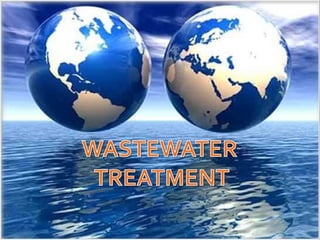
Wastewater treatment
- 2. It Is the process of removing contaminants from wastewater and household sewage, both runoff (effluents) and domestic. These waters are contaminated by several factors: waste, waste, detergents, oils, chemicals, among others. For that reason, it is important to give treatment to recover and not lose it.
- 3. PRE-TREATMENT: Pre-treatment removes materials that can be easily collected from the raw waste water before they damage or clog the pumps and skimmers of primary treatment clarifiers (trash, tree limbs, leaves, etc.). In the treatment of wastewater can distinguish four stages which include chemical, physical and biological:
- 4. SCREENING The influent sewage water is screened to remove all large objects like cans, rags, sticks, plastic packets etc. carried in the sewage stream. This is most commonly done with an automated mechanically raked bar screen in modern plants serving large populations, whilst in smaller or less modern plants a manually cleaned screen may be used. GRIT REMOVAL Pre-treatment may include a sand or grit channel or chamber where the velocity of the incoming wastewater is adjusted to allow the settlement of sand, grit, stones, and broken glass.
- 5. PRIMARY TREATMENT: In the primary sedimentation stage, sewage flows through large tanks, commonly called "primary clarifiers" or "primary sedimentation tanks." The tanks are used to settle sludge while grease and oils rise to the surface and are skimmed off. Primary settling tanks are usually equipped with mechanically driven scrapers that continually drive the collected sludge towards a hopper in the base of the tank where it is pumped to sludge treatment facilities. Grease and oil from the floating material can sometimes be recovered for saponification. The dimensions of the tank should be designed to effect removal of a high percentage of the floatables and sludge. A typical sedimentation tank may remove from 60 to 65 percent of suspended solids, and from 30 to 35 percent of biochemical oxygen demand (BOD) from the sewage.
- 6. SECUNDARY TREATMENT: Secondary treatment is designed to substantially degrade the biological content of the sewage which are derived from human waste, food waste, soaps and detergent. The majority of municipal plants treat the settled sewage liquor using aerobic biological processes. To be effective, the biota require both oxygen and food to live. The bacteria and protozoa consume biodegradable soluble organic contaminants and bind much of the less soluble fractions into floc.
- 8. TERTIARY TREATMENT : Removes the pollutants were not sufficiently removed in secondary treatment ; As solids, nitrogen, phosphorus, and other pollutants such as color and metals. The purpose of tertiary treatment is to provide a final treatment stage to raise the effluent quality before it is discharged to the receiving environment (sea, river, lake, ground, etc.).
- 9. TERTIARY TREATMENT - FILTRATION: Sand filtration removes much of the residual suspended matter. - NUTRIENT REMOVAL: Wastewater may contain high levels of the nutrients nitrogen and phosphorus. In certain ways that can be toxic to fish. - DISINFECTION: The purpose of disinfection in the treatment of waste water is to substantially reduce the number of microorganisms in the water to be discharged back into the environment. The effectiveness of disinfection depends on the quality of the water being treated (cloudiness, pH, etc.),
Notas do Editor
- Sewage treatment generally involves three stages, called : Pre- treatment, primary, secondary and tertiary treatment
- El propósito del tratamiento terciario es proporcionar una etapa final de tratamiento para elevar la calidad de los efluentes antes de su descarga al medio receptor (mar, río, lago, suelo, etc) -Elimina los contaminantes que no fueron lo suficientemente removidos en el tratamiento secundario. Como sólidos, nitrógeno, fósforo y otros contaminantes tales como el color y los metales. Se utilizan filtros de arena, que son preferibles cuando hay que filtrar flóculos (grumos) formados químicamente. ( Sand filters are used when you have to filter flocs (lumps) formed chemically.)
- Filtración La filtración de arena remueve gran parte de los residuos de materia suspendida. Remoción de nutrientes Las aguas residuales pueden contener altos niveles de los nutrientes nitrógeno y fósforo. La liberación excesiva para el medio ambiente puede conducir a una acumulación de nutrientes, puede ser tóxico para peces DESINFECCION: reducir substancialmente el número de organismos vivos en el agua que se descargará nuevamente dentro del ambiente. La efectividad de la desinfección depende de la calidad del agua que es tratada (por ejemplo: turbiedad, pH, etc.),